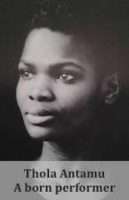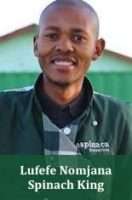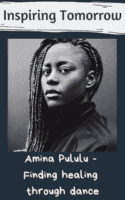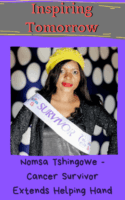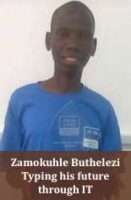Extreme poverty may force a new mother to do a horrible thing such as abandoning her new-born baby. As much as this act is unjustifiable, she could give you reasons that would cause tears to drop down your face. Thola Antamu’s mother left her, a tiny, one-day-old child, just outside a farm gate in uMlazi, KwaZulu-Natal.
Yet today, at twenty-six, Thola is an acclaimed freelance performance artist, poet, theatre producer, dancer and drama teacher.
“I was in full clothing when a man found me, and I had a little bag next to me. The nurses at the hospital think that the man who found me was possibly my biological father or someone who was related to my parents,” says Thola.
Fittingly, her full name is Tholakele, which means ‘she has been found’ in the isiZulu language.
“He then took me into uMlazi Place of Safety where my foster mother was working. I got very sick and I was my mother’s first patient.” Thola had been admitted just few days after her adoptive mom had relocated there. She was a physiotherapist but often also served as a doctor due to the institution being understaffed.
“She brought me back into health and decided she wanted to adopt me. My parents were breaking the law by having me as their child.” This was because her parents are white and apartheid laws prohibited interracial adoption. She adds that her mother had to bring her to the hospital during the day, so as not to raise any suspicions.
“At night I’d go back to my parents’ house. At the end of 1989 they were able to find adoption forms that were legal for them to sign. Three or four years later they were able to officially adopt me because the laws had changed.”
Like all South Africans, due to our apartheid past, Thola grew up highly race-conscious, and she knew from an early age that she was different from her parents.
“I remember being a shy girl. Often, older white people would want to touch my hair and carry me. My parents would be walking at the mall and random strangers would say, ‘Oh, she’s so cute. Can I touch her hair? How does her skin feel?’”
She adds that as a little girl that was frightening but her parents did, “an incredible job of making me proud. I’ve never been afraid of my blackness. My parents have been supportive and actually took the time to learn and understand my features, such as the gap in my teeth, which symbolises beauty in African cultures.” (Thola’s mom is Afrikaans and her father is English.)
Thola may have been found in KZN but she admits she doesn’t really exhibit Zulu features. “I’m a lot taller and darker than Zulus. My face shape is quite different so it might happen that I’m not Zulu. I’m quite interested to learn about where I’m from. Not because I want to go back there or I feel like I’m missing out, but I want to see similar features. Most people with their biological parents take that for granted.”
Thola doesn’t think adoptions are all dark and gloomy, so she’s crafting a play that aims to correct that misconception. “People have this dramatised image of what adoption means. People want to hear that you suffered, but not all adoptions are like that. I don’t feel like I was ever orphaned.”
Thola’s heart is even bigger than the stages she performs in: one would expect her to be bitter towards her biological parents. But she says, “It was quite clear they couldn’t do it so they left the baby with everything they had and could give. They hoped someone else would find it and give it something better. It’s brave to accept you can’t do good enough job for a baby and give it up to those that can. I’m grateful.”
“Look at your life and weigh up what you could be able to give a child. If you feel that you’re not able to raise it, then give it up for adoption rather than aborting it. I wouldn’t advise anyone to abandon their child.”
Thola says she’s proud of her family situation but that’s just a chapter of a bigger story. “That’s not a story I want to be recognised by. As an adult, as a woman and a performance artist there are other qualities I want people to recognise me for.”
In her best-known and most acclaimed performance, Exhibit S: Ode to Saartjie Baartman by a Black South African Woman, she depicts the life of Sarah Saartjie Baartman. Sarah was a Khoisan woman who lived more than two centuries ago, and she was seen as grotesquely strange by the racist European colonizers at the Cape. She was taken to Europe and put on show, like a freak, due to having large breasts, big hips and very big buttocks. People paid money to see her and she would dance and so on. She died there, a lonely death far from home, and her body was preserved in a French museum. Saartjie’s body was returned to South Africa and she was reburied on Women’s day in 2002.
Thola says, “Saartjie was just a woman. She looked the way she did because that was the type of woman she was. She was subjected to a lot of humiliation cos she was different. I wanted women to come and be my audience and share my anger because I felt like women are still sexualised even 225 years down the line.”
“Women of my colour are still feared and celebrated for their ‘hyper-sexed bodies’. Black is beautiful because it’s ‘sexy and animalistic’. I started this performance because that has to change.”
“I’m hoping with this performance piece to get women thinking about what they accept and where they draw the line. If women know where their line is then it’ll be easy for men to stop crossing it. So, that’s the conversation I wanted to start.”
Thola is always performing on stage but sometimes she is in an unwelcome spotlight off-stage. “My biggest challenge is that I don’t speak an African language and people properly hate me for that reason. That’s heartbreaking because I shouldn’t have to know an African language because I’m black. I shouldn’t have to explain my family situation to everyone.”
It’s Women’s Month and Thola has a message: “Women need to bind together and create some kind of image and platform that supports women rather than degrade them. Women and girls are being attacked by all this information and they are internalising it differently because they are not well educated and supported. Education can be used as a weapon that can protect women from any bad influences.”
“The biggest gift that a woman could allow herself to have is love. Not enough people have love for themselves. If you truly love yourself then you already are a hero.”
Experience has been her driver and she says she has to make sure that she makes use of the chances she’s been given. Thola’s life began in hardship but she’s dedicated herself to working for women’s full acknowledgement and empowerment.
Wathint’ abafazi, wathint’imbokodo. You Strike a Woman, You Strike a Rock.
Note: If you Google ‘Thola Antamu’ many photographs of her will come up, including marvellous pictures of her performing as Saartjie Baartman, wearing a special costume.
***
Tell us: It’s women’s month, what do you think of how women are being treated and portrayed in the media?


